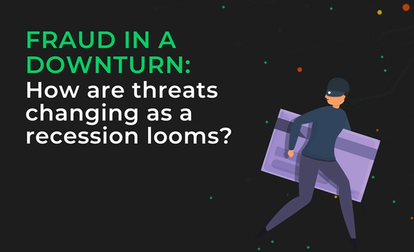Fraud in a downturn: how are threats changing as a recession looms?

Updated economic forecasts from the Office for Budget Responsibility (OBR) offered a glimmer of hope at the Chancellor’s Spring Budget last month, with news that the UK economy isn’t expected to enter a recession in 2023. Despite the good news, higher bills and rising prices haven’t gone away, and with interest rates still rising, many people are struggling with higher debt repayment costs.
Unfortunately, it’s not just interest rates that are rising. The rising cost of living is also being accompanied by a surge in fraud, where scammers are targeting households that are already struggling to keep up with soaring inflation.
If you’re concerned about the uptick in fraud and want to learn more about the latest scams, we’ve pulled together this helpful guide with everything you need to know.
Scams to watch out for
1. Cost-of-living payment scams
In the current economic climate, fraudsters are taking advantage of the cost-of-living crisis for their own gain, and some may contact you under false premises offering help and support.
In particular, the Department for Work and Pensions (DWP) has issued a warning following reports of scam text messages, emails, and calls, urging people to apply for the Government’s cost-of-living payments by registering via a link.
The cost-of-living payments, which were launched in May 2022, offer £650 to low-income households and those most impacted by rising costs. However, if you’re eligible for the scheme, you don’t need to register or do anything at all – the Government will make payments automatically. They’ll also never request your banking details in this way.
2. Energy Bill Support Scheme fraud
Scammers are also exploiting the Government’s Energy Bill Support Scheme measures; according to Action Fraud, there has been a rise in fake text messages, emails, and calls from the Government claiming to offer discounts on energy bills as part of the scheme.
Again, these messages contain links to websites that are designed to steal your personal and financial details. Although these websites may look genuine, never share your details in this way. Remember, all UK households are eligible for the Government’s Energy Bill Support Scheme, and this is applied to your monthly bill automatically – you’ll receive the relief without having to do anything at all.
3. Investment fraud
In times of economic hardship, there is usually an uptick in ‘make money fast’ investment schemes with unusually high returns, as scammers prey on those looking to save as much as they can to offset rising bills and costs.
Fraudsters typically contact people seemingly at random with an investment ‘opportunity’, urging them to buy into fake schemes or products that don’t exist. Once the scammer has received payment, they then disappear and cut off all contact with the victim.
If you suspect an investment may be too good to be true, it probably is. If in doubt, you can always consult the Financial Conduct Authority (FCA) register or Warning List if you’re unsure if an investment company or opportunity is legitimate. If the company is not properly regulated, then you could risk losing your money, as you may not be covered by the Financial Ombudsman Service (FOS).
Steps to take if you’ve been scammed
According to statistics, 4.6 million people are impacted by fraud every year, and a further 700,000 go on to struggle with the lasting impact and financial losses incurred. In some cases, people shy away from reporting fraud because they’re embarrassed. If this sounds like you, don’t suffer in silence – you’re not alone, and there are practical steps that can be taken to help.
1. Contact your bank
If you think that you’ve been defrauded, getting in touch with your bank or building society should always be your first port of call.
Doing so ensures that you can protect your account, as your bank will be able to take appropriate action, like cancelling your card, changing your security details, or blocking any strange transactions to protect your account. In many cases, your bank may even be able to refund money stolen as fraud or identity theft, which minimises the financial impact.
After you’ve informed your bank, you should monitor your account closely for any unusual transactions and check your credit score to see if there are any applications for credit that you don’t recognise.
2. Get in touch with Action Fraud
Next, getting in touch with Action Fraud to report the scam is vital. Not only will this help enforcement authorities track down and stop the criminals responsible, but you’ll also be provided with guidance and about next steps – the team at Action Fraud will be able to provide updates, refer you along to crucial support services, as well as offering help on how you can seek compensation.
3. Seek compensation
If you’ve lost money due to a scam, then there are steps you can take to help you get it back. As mentioned earlier, your bank may be able to refund the money in some circumstances, but in certain cases, they could decline to do so due to ‘gross negligence’.
According to the FCA, this is defined as a ‘very significant degree of carelessness’ – however, even if you’re concerned that you acted carelessly, it’s always worth getting in touch with your bank so that they can investigate. You could also take your fraudster to court to demand compensation.
Times are tough, and scams are becoming more sophisticated as Government support and technologies change. Anyone can fall victim to fraud, and it’s nothing to be embarrassed or ashamed about. But it is important to remain vigilant and act quickly if you think you’ve been targeted.





